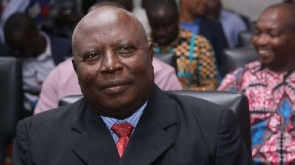Politics of Tuesday, 21 November 2023
Source: www.ghanaweb.com
Learn from Fomena: Prof Azar's cryptic message amidst NPP's dismissal of 4 members
Professor Stephen Kwaku Asare, popularly known as Kwaku Azar, has urged political parties to reconsider the practice of expelling its members, in the wake of the New Patriotic Party's dismissal of four leading members.
Professor Azar questioned the constitutional implications of the party’s action.
He pointed out that some party members pay dues, contribute ideas, time, and funds, emphasizing that expelling such contributors raises questions about the party's benefit from rejecting these resources.
In a statement, he noted that in some political landscapes, party members may not even have voting rights in primaries, rendering the expulsion of non-executive members invalid.
“I have never understood the idea of political parties expelling members. To be sure, I understand why a party may expel an executive member on grounds stipulated in the constitution but what does it mean to expel Yaw Berko, an ordinary member of the party?
“In a functional democracy where party membership gives a right to vote at the primaries, such a move could trigger constitutional questions as that suffrage flows from the Constitution and can’t be assailed by a party. In Umuofia, most party members have no vote at the primaries anyway. So, expulsion has suffrage consequences only if one were a delegate.
“Some party members pay their dues. Expulsion means the party is rejecting future receipt of the dues. Why reject dues? Will past dues be refunded? Some members contribute to parties by way of donating funds, ideas, time, etc. They also persuade friends, family, associates, etc. I am unsure of how a party benefits from rejecting these contributions.
“A party member’s most valuable contribution is to vote for party candidates in general elections. This is why most parties work to increase their membership,” part of his statement said.
He urged political parties to embrace diversity in their membership categorizing members into ideologues, partisans, and loyalists.
He emphasized the importance of understanding and managing the tensions that arise among these factions.
“Even if a member supports an independent MP, a party should still covet his presidential vote. Even if a member supports an independent presidential candidate, a party should still covet his parliamentary vote.
“Parties should move towards one member one vote (OMOV) in primaries. This is not just what the Constitution demands in article 55, it is also the surest way to get the members buy in on the parties’ candidates.
“The more members who vote in primaries the higher the likelihood that members support the parties’ choices. Conversely, the less members who vote in primaries, the higher the likelihood that members will prefer others.
“Ultimately, the best way to get members’ buy in on the parties’ choices is to make them co-sponsors of the candidates rather than impose delegates’ sponsored candidates on them.”
Professor Azar urged political parties to view themselves as entities bringing together like-minded individuals to advance citizens' interests rather than merely as vehicles for capturing political power and distributing benefits.
Reflecting on the lessons from the Fomena constituency, where independent candidate Andrews Amoako Asiamah secured victory in the 2020 elections, Prof Azar underscored the importance of parties coveting the votes of members, even if they support independent candidates in specific races.
“A political party brings together people with the same political ideas to draw out programs that advance and promote the interests of the citizens. Under this view of a political party, parties should have no interest in expelling ordinary members for expressing their ideas or preferences for non-party choices.
“Of course, a political party may be narrowly defined as a vehicle for capturing political power and using that power to confer benefits on those perceived to have been central to the acquisition of power. Under this view, parties will keep a lid on “membership” to deny benefits to expelled members!!!!
“Parties should learn from Fomena!”
AM/SARA
Ghana’s leading digital news platform, GhanaWeb, in conjunction with the Korle-Bu Teaching Hospital, is embarking on an aggressive campaign which is geared towards ensuring that parliament passes comprehensive legislation to guide organ harvesting, organ donation, and organ transplantation in the country.
Watch the latest episode of Everyday People below:
Entertainment










